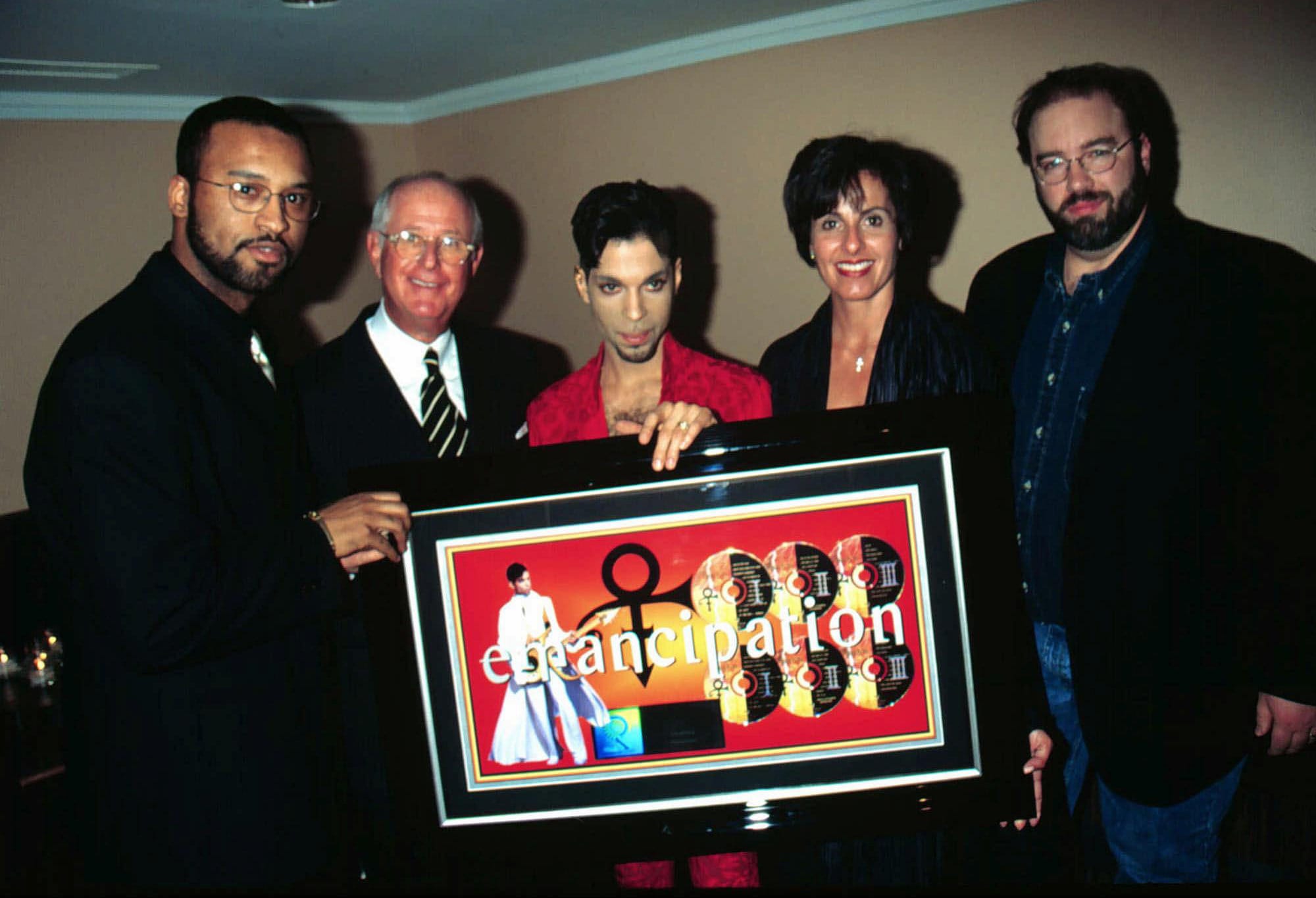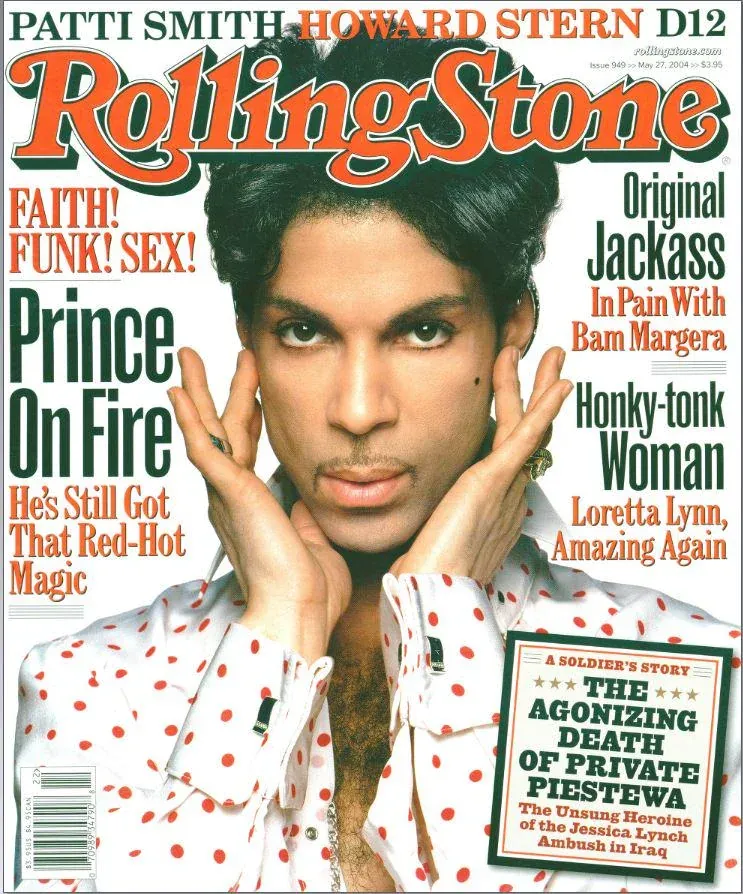Donald Trump (Black Version)
Don't quote Prince on that. Seriously.

In 1989, Prince and Morris Day worked on assembling a fourth album by The Time, the ultimately-unreleased Corporate World. Neither man had a crystal ball when Prince penned and Morris laid down vocals to the slick ballad "Donald Trump (Black Version)"—ostensibly, a forum for Day's sensuous on-record persona to offer opulence to a potential conquest. When the song made The Time's 1990 release Pandemonium, none of the original seven band members considered that the man in the title would, in less than 40 years' time, become a virulent, xenophobic sputterer at the top of America's political food chain, grinning from the White House roof without having the decency to topple off, babbling from the Resolute Desk as his cronies gutted systems and norms that will be difficult, if not impossible, to wriggle back in the average Gen Xer or millennial's lifetime.
Pandemonium's big, forgotten hit—and indeed, The Time's highest charter—was the Top 10 killer "Jerk Out," a reformatted Prince outtake from the mid-'80s.
"Donald Trump (Black Version)" is unfortunately an apt way to describe the Prince estate now: hazy, greedy and concerned with driving a narrative home over even the cold, hard facts we treasure. We've seen this, most recently and most simply, in the form of the recent spate of quotes shared to Prince's social media channels that seem to have little to no basis in reality.
"Perhaps the memory of an artist who championed 'real music by real musicians' would be better served by real quotes with real citations," I summarized in a just-published Ultimate Classic Rock news brief on the situation. That's one way of putting it. Another way—a more dramatic way—would be "we need to nip this shit in the bud before we start further desecrating the memory of Prince."
If you're a white-collar professional, you probably deal with two things regularly: the boring monotonies of artificial intelligence (insisted upon the creative and tech spaces by increasingly sweaty know-nothings who prattle about it being "the future") and the eye-crossing pile-up of straight-up lies in our lives (mostly at the hands of dog-stupid politicians and oligarchs who gamble on our immediate well-being and futures with all the grace of Rowan Atkinson in any of the three(?!) Johnny English movies).
What extremely sucks about this Prince quotes situation—which, to be clear, is not nearly as important as famine conditions in war-torn countries, or the deployment of the National Guard to "keep peace" in American cities—is that it's the worst of both, with an artist who means so much to so many people (to say nothing of myself). And it already feels par for the course. This is, after all, the same estate that junked a by-most-accounts fascinating and harrowing portrait of the wholly imperfect man who was a vital creative force in popular music, all in favor of...what, exactly? "The vault is freed"?

There's only so much I can think about that can of worms until I threaten to give myself a migraine. Instead, I'll think about these chilling truths, and ask that you do the same:
- Someone—I refuse to be base enough to suggest it's an intern, although I don't suspect it's someone who has any semblance of power within the Prince estate infrastructure—is picking hokey, inaccurate Prince "quotes" for inspirational social content instead of any hundreds of pithy, memorable bon mots he did drop in various features and interviews, all of which are easy enough to track down with an Internet connection or library card.
- There were, at one point, people drawing salaries or other financial compensation as researchers, guardrails, context-setters—working against this tide of post-truth smarm, which should have no place in marketing a dead musician or the federal government. I know these people. I was these people. These positions don't exist now, and in their place we have...what, exactly? Someone who trusts LinkedIn as a viable source of musical information?
- A deeply distressing, nonzero amount of people—from fans to Jimmy Jam, a man who knew Prince—will click "like" on or otherwise engage with this hokum. In turn, Prince's reputation as a challenging (and challenged) performer and thinker, whose boundary-shattering approaches to race, sex and faith in music helped open millions of proverbial third eyes, will erode into a "weird but cool" miasma, fit to quicken pulses ever so quickly as you brush against a stack of Purple Rain t-shirts at Target.
- Absolutely none of this will move the needle on further posthumous projects featuring material from Prince's storied vault, the last of which was released in 2023—a downright glacial pace compared to the flurry of quality releases in the period which the estate was controlled by a bank.
- Nor will it offer a chance for moral clarity to the public-facing representatives of Prince's estate, who in tweet after tweet resemble Eric Adams without the presumption of swag, as they murmur platitudes about what Prince would have wanted, none of which was the merchandising e-mails zapped into our inboxes every few weeks.
I know it seems like small potatoes in the grand scheme of things. But like all the maddening things we flood our elected officials' voicemails with or take the streets to protest, we have to reject this behavior on its face. If we don't speak out about something as frivolous and painfully, ultimately anti-art as "Prince dully misquoted by his own estate social team," perhaps the future lies in an even better, absolutely faithful Prince lyric: "What if half the things ever said / Turned out 2 B a lie / How will U know The Truth?"
One of my picks for top 5, at least top 10, Prince albums.
